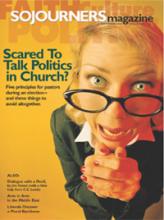Our travel fund for editorial staff is fairly modest. So we carefully consider whether we can afford to go to a given location in order to research an article or attend an event. Since, for example, Miami might sometimes be too pricey, Mumbai, India, isn't even in the running as a destination.
Luckily, some of us have family members who get around. Assistant editor Elizabeth Palmberg, who has a passion for issues of international economic justice, wanted to attend the 2004 World Social Forum, to be held in Mumbai. Her father, a professor of ophthalmology, regularly gets invited far and wide to lecture on the treatment of glaucoma. In other words, he stacks up some serious frequent flyer miles. So Elizabeth was on her way to India. (She thinks it's ironic that since drug companies sponsor many of her dad's talks, to some extent the pharmaceutical industry unwittingly paid for her to go to the Forum.)
The World Social Forum has been described as "one of the more interesting and important civil society experiments on the planet." Elizabeth describes it as gloriously chaotic. It was started as a grassroots alternative to the annual meeting of corporate leaders and government officials at the World Economic Forum in Davos, Switzerland. The Social Forum gathers thousands of activists, academics, representatives of nongovernmental organizations, and regular citizens to discuss ways to deal with globalization and interconnected issues of development, the environment, and human rights.
In the midst of this amazing collection of people, Elizabeth had the rare opportunity to interview Awut Deng Acuil, a church peace activist from southern Sudan. Thanks to Deng's graciousness (and of course Dr. Palmberg's miles), we include in this issue her story, one of courage and faithfulness in the face of great loss and many setbacks.
Read the Full Article
